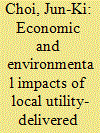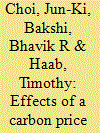| Srl | Item |
| 1 |
ID:
162322


|
|
|
|
|
| Summary/Abstract |
Manufacturing operations are constantly encouraged to include energy-efficient practices into their plant operations, including through rebate programs that provide monetary rewards for firms who purchase and employ energy-efficient equipment in their facilities. This article presents a novel methodology for analyzing the cascading economic and environmental effects of an electric utility company's industrial energy-efficiency rebate programs and applies it to the case of a local utility located in the U.S. state of Ohio. It examines the utility's industrial rebate programs for lighting, motor, and heating, ventilation, and air conditioning (HVAC) systems and estimates the economic and environmental impacts of the programs using an input-output modeling framework. All three rebate programs provided a modest economic boost not only to directly involved equipment manufacturers and marketing service providers, but also to other upstream industries responding to the direct impact and the final demand augmented by the associated increase in value added in the regional economy. Emissions avoided as a result of electricity savings were found to outweigh additional emissions generated from the production of the energy-efficiency equipment in the region throughout the program years. However, if the full equipment purchase data were made available, the amount of added CO2 emissions would be larger.
|
|
|
|
|
|
|
|
|
|
|
|
|
|
|
|
| 2 |
ID:
096719


|
|
|
|
|
| Publication |
2010.
|
| Summary/Abstract |
Despite differences in their implementation, most carbon policies aim to have similar outcomes: effectively raising the price of carbon-intensive products relative to non-carbon-intensive products. While it is possible to predict the simple broad-scale economic impacts of raising the price of carbon-intensive products-the demand for non-carbon-intensive products will increase-understanding the economic and environmental impacts of carbon policies throughout the life cycle of both types of products is more difficult. Using the example of a carbon tax, this study proposes a methodology that integrates short-term policy-induced consumer demand changes into the input-output framework to analyze the environmental and economic repercussions of a policy. Environmental repercussions include the direct and the indirect impacts on emissions, materials flow in the economy, and the reliance on various ecosystem goods and services. The approach combines economic data with data about physical flow of fossil fuels between sectors, consumption of natural resources and emissions from each sector. It applies several input-output modeling equations sequentially and uses various levels of aggregation/disaggregation. It is illustrated with the data for the 2002 U.S. economy and physical flows. The framework provides insight into the short-term complex interactions between carbon price and its economic and environmental effects.
|
|
|
|
|
|
|
|
|
|
|
|
|
|
|
|
| 3 |
ID:
097512


|
|
|
|
|
| Publication |
2010.
|
| Summary/Abstract |
Despite differences in their implementation, most carbon policies aim to have similar outcomes: effectively raising the price of carbon-intensive products relative to non-carbon-intensive products. While it is possible to predict the simple broad-scale economic impacts of raising the price of carbon-intensive products-the demand for non-carbon-intensive products will increase-understanding the economic and environmental impacts of carbon policies throughout the life cycle of both types of products is more difficult. Using the example of a carbon tax, this study proposes a methodology that integrates short-term policy-induced consumer demand changes into the input-output framework to analyze the environmental and economic repercussions of a policy. Environmental repercussions include the direct and the indirect impacts on emissions, materials flow in the economy, and the reliance on various ecosystem goods and services. The approach combines economic data with data about physical flow of fossil fuels between sectors, consumption of natural resources and emissions from each sector. It applies several input-output modeling equations sequentially and uses various levels of aggregation/disaggregation. It is illustrated with the data for the 2002 U.S. economy and physical flows. The framework provides insight into the short-term complex interactions between carbon price and its economic and environmental effects.
|
|
|
|
|
|
|
|
|
|
|
|
|
|
|
|